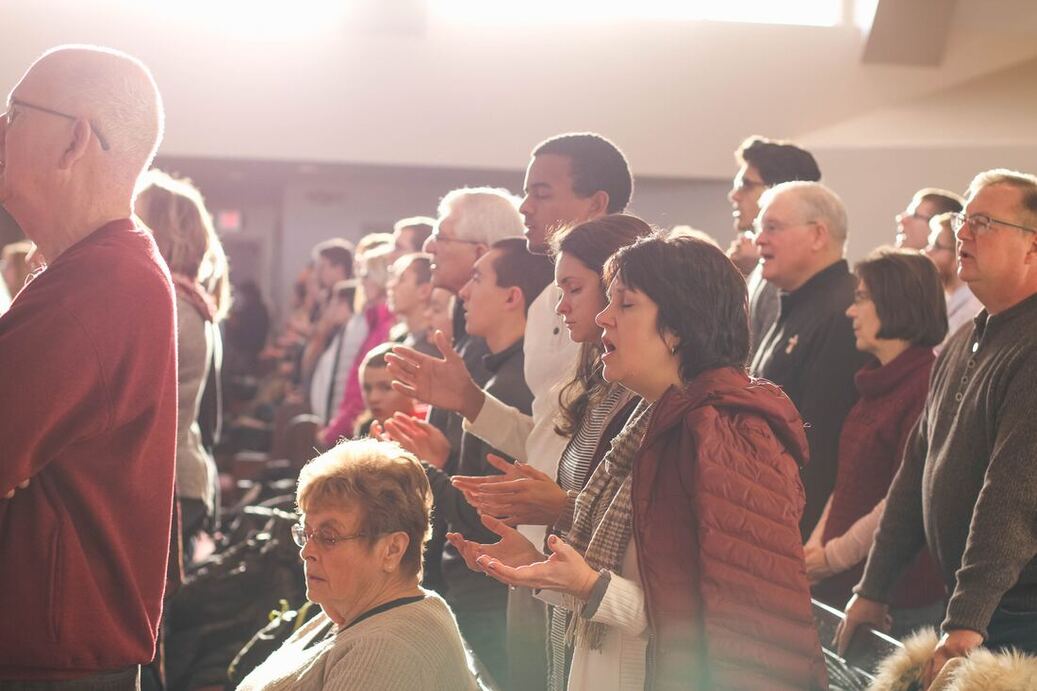|
CATECHUMENATE - Rolling Year Round
by Sue Thomas I am passionate about the Rite of Christian Initiation of Adults (RCIA). It is dynamic and life-changing, not just for those being incorporated into the Body of Christ, but for the Body of Christ itself, the Church. When talking with my peers the conversation inevitably turns to RCIA.
I swear I can see their eyes glaze over with that look of ‘Here she goes again!’ The Rite of Christian Initiation of Adults is a liturgical book, arguably the most flexible of all the rites of the Church in its implementation. It grounds all our initiatory practice. It locates a sequence of liturgical rites in a life-changing process of growing into the faith of the Church. Its primary focus is the not-yet baptised adult. The rite of initiation is suited to a spiritual journey of adults that varies according to the many forms of God’s grace, the free cooperation of the individuals, the action of the Church, and the circumstances of time and place (RCIA 5). INTRODUCING AN ONGOING CATECHUMENAL JOURNEY I believe that the RCIA calls parishes to embrace the concept of a Year-Round Initiation Process, a dynamic ongoing journey of spiritually walking with adults who are growing in their relationship with God. Parishes need to let go of ‘Initiation by Classes’, that is, a program of teaching which, combined with good will and true desire, leads to the sacraments of Christian initiation. Parishes need to let go of a ‘Nine Month Initiation’ which begins mid-year when the previous cycle has finished and ends after Easter. |
The RCIA says ‘nothing can be settled a priori’, which means, don’t count on last year’s process working this year, because, with different people involved, it probably won’t. Spiritual journeying with adults is in step with the way they respond to God’s grace; it accommodates the life circumstances of all those involved; it is in harmony with the life of the Church and the culture of the parish. So the journey might take a full liturgical year, or several if necessary.
The initiation of catechumens is a gradual process that takes place within the community of the faithful. By joining the catechumens in reflecting on the value of the paschal mystery and by renewing their own conversion, the faithful provide an example that will help the catechumens to obey the Holy Spirit more generously (RCIA 4). Journeying with catechumens involves not just the RCIA team, catechists, sponsors and priests. It involves the whole community. How do you do that?
The initiation of catechumens is a gradual process that takes place within the community of the faithful. By joining the catechumens in reflecting on the value of the paschal mystery and by renewing their own conversion, the faithful provide an example that will help the catechumens to obey the Holy Spirit more generously (RCIA 4). Journeying with catechumens involves not just the RCIA team, catechists, sponsors and priests. It involves the whole community. How do you do that?
KNOW YOUR PARISH
Review your parish and how it lives out its baptismal call to God’s mission. RCIA 75 offers four pillars which form the basis of such a review. They are Word (scripture), Community (culture), Worship (liturgy) and Mission (living the Christian life). How does your parish hear, explore and proclaim the word? How does it pray, celebrate and worship God? Who are you as a parish? Know your parish story and your parish groups and services. What is your parish mission, that is, how do you take up the mission of God who sent his Son so that we might have life?
REVIEW YOUR CURRENT PRACTICE
Honestly and objectively, ask the questions: Who does what, when, where, how and why? What works? What doesn’t work? Invite ‘fresh eyes’ into the conversation. Invite input from the whole community, involving the Parish Pastoral Council and other parish groups. What has been their experience of RCIA? Are they involved? If not, why not? How many of the ritual moments in the RCIA are celebrated? What percentage of neophytes continue to be involved in the life of the parish after one, two, five years? It would be a worthwhile exercise to invite feedback from past RCIA participants about their experience of the process. Let go of we’ve always done… Can you approach what you do in a different way?
Review your parish and how it lives out its baptismal call to God’s mission. RCIA 75 offers four pillars which form the basis of such a review. They are Word (scripture), Community (culture), Worship (liturgy) and Mission (living the Christian life). How does your parish hear, explore and proclaim the word? How does it pray, celebrate and worship God? Who are you as a parish? Know your parish story and your parish groups and services. What is your parish mission, that is, how do you take up the mission of God who sent his Son so that we might have life?
REVIEW YOUR CURRENT PRACTICE
Honestly and objectively, ask the questions: Who does what, when, where, how and why? What works? What doesn’t work? Invite ‘fresh eyes’ into the conversation. Invite input from the whole community, involving the Parish Pastoral Council and other parish groups. What has been their experience of RCIA? Are they involved? If not, why not? How many of the ritual moments in the RCIA are celebrated? What percentage of neophytes continue to be involved in the life of the parish after one, two, five years? It would be a worthwhile exercise to invite feedback from past RCIA participants about their experience of the process. Let go of we’ve always done… Can you approach what you do in a different way?
RETHINK AND REBUILD
Go to the Rite. There is no need to reinvent the wheel. The RCIA contains the rites of the Church. It is all there. Be familiar with the Rite. It is your friend.
Be open to adaptation. Build on what works. Adapt, change or discard what doesn’t work. Talk with others involved in RCIA ministries. Contact your diocesan RCIA coordinator. This helpful person will be a positive support and encouragement, give you a plethora of information and put you in contact with others. Contact neighbouring parishes. Are you able to share resources, such as catechists, or combine your groups for discussion?
Identify what the catechumens actually need to explore. You may be expending energy on the unnecessary. Use the four pillars of the RCIA to guide your approach to catechesis. Connect the word with experiences of community, worship and mission. Catechesis does not always have to involve a discussion group. The Eucharist is our source and summit. If life is getting a bit crazy, consider dropping a meeting rather than missing the opportunity of attending Mass surrounded by the community of the faithful. Search out events in your parish, deanery and diocese that will support catechesis. Create a calendar: anniversary Masses and ordinations, seminars and guest speakers. The value of experiencing different liturgies, listening to different ways of thinking, and then reflecting on the experience is immeasurable.
Using the knowledge gained from the parish review, explore the ways parishioners can be invited to contribute to the journey. Parishioners may want to be involved but, for a variety of reasons, are reluctant to commit to a longer journey. Being involved for shorter periods of time can be attractive. Consider inviting different people to facilitate discussion sessions. Create roles for those who may not be suitable catechists or sponsors, for example, administrative tasks, preparing the PowerPoint for liturgies or workshops. Invite the social butterflies to take a catechumen under their ‘wing’ during parish functions. Ask the contemplatives to lead sessions on prayer.
Consider the life stages of catechumens and identify their areas of interest. Which parish groups can be tapped into? For example, invite a young mother to join the parish playgroup. Involve parents with children preparing for confirmation and first communion in the Sacramental Team and, by becoming involved in the behind the scenes work, enrich their experience of the sacraments and liturgy. Encourage teenagers to join the parish or deanery youth group. Young adults may consider joining Rosies. Is there a St Vincent de Paul conference, a Men’s Shed, a craft group, a Care and Concern group, a choir? Parish groups are opportunities to involve parishioners in subliminally evangelising catechumens.
Go to the Rite. There is no need to reinvent the wheel. The RCIA contains the rites of the Church. It is all there. Be familiar with the Rite. It is your friend.
Be open to adaptation. Build on what works. Adapt, change or discard what doesn’t work. Talk with others involved in RCIA ministries. Contact your diocesan RCIA coordinator. This helpful person will be a positive support and encouragement, give you a plethora of information and put you in contact with others. Contact neighbouring parishes. Are you able to share resources, such as catechists, or combine your groups for discussion?
Identify what the catechumens actually need to explore. You may be expending energy on the unnecessary. Use the four pillars of the RCIA to guide your approach to catechesis. Connect the word with experiences of community, worship and mission. Catechesis does not always have to involve a discussion group. The Eucharist is our source and summit. If life is getting a bit crazy, consider dropping a meeting rather than missing the opportunity of attending Mass surrounded by the community of the faithful. Search out events in your parish, deanery and diocese that will support catechesis. Create a calendar: anniversary Masses and ordinations, seminars and guest speakers. The value of experiencing different liturgies, listening to different ways of thinking, and then reflecting on the experience is immeasurable.
Using the knowledge gained from the parish review, explore the ways parishioners can be invited to contribute to the journey. Parishioners may want to be involved but, for a variety of reasons, are reluctant to commit to a longer journey. Being involved for shorter periods of time can be attractive. Consider inviting different people to facilitate discussion sessions. Create roles for those who may not be suitable catechists or sponsors, for example, administrative tasks, preparing the PowerPoint for liturgies or workshops. Invite the social butterflies to take a catechumen under their ‘wing’ during parish functions. Ask the contemplatives to lead sessions on prayer.
Consider the life stages of catechumens and identify their areas of interest. Which parish groups can be tapped into? For example, invite a young mother to join the parish playgroup. Involve parents with children preparing for confirmation and first communion in the Sacramental Team and, by becoming involved in the behind the scenes work, enrich their experience of the sacraments and liturgy. Encourage teenagers to join the parish or deanery youth group. Young adults may consider joining Rosies. Is there a St Vincent de Paul conference, a Men’s Shed, a craft group, a Care and Concern group, a choir? Parish groups are opportunities to involve parishioners in subliminally evangelising catechumens.
|
THE VISION: AN INITIATING PARISH
We can already see that the RCIA does not imagine the candidates forming one little parish group among many others. Christian initiation is a process that leads to a sharing of faith and life. So inform and invite the whole community. Communicate as much as possible as frequently as possible. Make use of the parish and school newsletters, notice boards, and websites. Offer to host regional, deanery and diocesan RCIA formation sessions, and formally invite the ‘decision makers’ in the parish, for example, the Parish Pastoral and Finance Councils, the administration, liturgy, baptismal preparation and sacramental teams. Invite the staff of parish schools and catechists in state schools. If a parish is new to implementing the RCIA, there may be some small value in commencing with an interim nine-month model, in order to give a reassuring structure as people become familiar with the content of the Rite. However, the goal is always to establish a flexible journey that respects the individual needs of each participant. The focus is not to form an annual RCIA group. The focus is to walk spiritually with each individual who is exploring the meaning of a relationship with God within the Christian community. This is their journey, not the group’s journey, or the journey we think they need to have. |
GO TO THE RITE. Be familiar with it. It is your friend.
Discernment of the readiness is individual. Rites and rituals marking moments of transition in the journey might also be individual, though celebrated at the Mass the catechumen usually attends, surrounding the person with familiar faces. The journey is oriented towards the celebration of the sacraments of Christian initiation at the Easter Vigil. Except in danger of death or some other equally serious pastoral reason, we cannot deny a person and the initiating community the full experience, the richness and depth of the Easter Vigil. But we can’t make them wait that long! is not a valid reason to terminate a profoundly rewarding journey and anticipate the sacraments by a few weeks or a couple of months.
CONCLUSION
Delete the word ‘program’ from the RCIA vocabulary and replace it with the word ‘journey’. Work smarter, not harder, doing the best you can with what you have. We are a pilgrim Church and a pilgrim people does not stand still. What worked last year may not work this year, nor work ever again. Widen your vision, and draw in the parish community. Think outside the square.
I would encourage parishes to bite the bullet and introduce the RCIA in all its glorious, rich messiness. Bypass the neat and clean. The rewards are far greater for all concerned. Participants become more well-rounded and fully-formed members of the community. The post-Easter mystagogia becomes a lifelong journey in the midst of the whole community. Life as a Christian always involves reflection, continuing discernment of God’s will, consolidation and active response.
I conclude with a phrase Cardinal Walter Kasper wrote about the work of ecumenical dialogue: Patience is the little sister of Christian hope.
Discernment of the readiness is individual. Rites and rituals marking moments of transition in the journey might also be individual, though celebrated at the Mass the catechumen usually attends, surrounding the person with familiar faces. The journey is oriented towards the celebration of the sacraments of Christian initiation at the Easter Vigil. Except in danger of death or some other equally serious pastoral reason, we cannot deny a person and the initiating community the full experience, the richness and depth of the Easter Vigil. But we can’t make them wait that long! is not a valid reason to terminate a profoundly rewarding journey and anticipate the sacraments by a few weeks or a couple of months.
CONCLUSION
Delete the word ‘program’ from the RCIA vocabulary and replace it with the word ‘journey’. Work smarter, not harder, doing the best you can with what you have. We are a pilgrim Church and a pilgrim people does not stand still. What worked last year may not work this year, nor work ever again. Widen your vision, and draw in the parish community. Think outside the square.
I would encourage parishes to bite the bullet and introduce the RCIA in all its glorious, rich messiness. Bypass the neat and clean. The rewards are far greater for all concerned. Participants become more well-rounded and fully-formed members of the community. The post-Easter mystagogia becomes a lifelong journey in the midst of the whole community. Life as a Christian always involves reflection, continuing discernment of God’s will, consolidation and active response.
I conclude with a phrase Cardinal Walter Kasper wrote about the work of ecumenical dialogue: Patience is the little sister of Christian hope.
POSTSCRIPT: THE ALREADY BAPTISED
The RCIA is intended for those who are not baptised who will become catechumens preparing for initiation. Remember that the words of the rites reflect this. For example, the words of the Rite of Acceptance do not make sense for someone who is baptised. Conversely it does not make sense for the elect to celebrate the Sacrament of Penance before the Easter Vigil as a baptised person might do. Instead there are the scrutinies.
Due to a lack of people resources, there may be a need to form a combined group of catechumens and already baptised candidates. Respect however the baptism of those already baptised by clearly differentiating between catechumens and candidates. If you understand why you are doing what you are doing, you will avoid the baptised candidates feeling that they have somehow been ‘left out’ or that their journey is not as important as that of the catechumens.
Reception into Full Communion of the already baptised can be celebrated at any time during the year according to the candidate’s readiness. It is unnecessary to celebrate this rite during the Easter Vigil. For older children who will be confirmed and receive their first communion at a later date, consider baptising them on Easter Sunday morning or during the Easter season rather than during the Vigil. Try to reserve the Easter Vigil for full Christian initiation, that is, the combined rites of Baptism, Confirmation and Eucharist.
The RCIA is intended for those who are not baptised who will become catechumens preparing for initiation. Remember that the words of the rites reflect this. For example, the words of the Rite of Acceptance do not make sense for someone who is baptised. Conversely it does not make sense for the elect to celebrate the Sacrament of Penance before the Easter Vigil as a baptised person might do. Instead there are the scrutinies.
Due to a lack of people resources, there may be a need to form a combined group of catechumens and already baptised candidates. Respect however the baptism of those already baptised by clearly differentiating between catechumens and candidates. If you understand why you are doing what you are doing, you will avoid the baptised candidates feeling that they have somehow been ‘left out’ or that their journey is not as important as that of the catechumens.
Reception into Full Communion of the already baptised can be celebrated at any time during the year according to the candidate’s readiness. It is unnecessary to celebrate this rite during the Easter Vigil. For older children who will be confirmed and receive their first communion at a later date, consider baptising them on Easter Sunday morning or during the Easter season rather than during the Vigil. Try to reserve the Easter Vigil for full Christian initiation, that is, the combined rites of Baptism, Confirmation and Eucharist.
Text by Sue Thomas
Images from Unsplash and Pixabay. Used under license/ with permission.
Images from Unsplash and Pixabay. Used under license/ with permission.
This article first appeared in Liturgy News 45(1) 2015
At the time of writing, Sue Thomas was
Chair of the Brisbane Archdiocesan Catechumenate Committee
and pastoral associate of Surfers Paradise Parish
At the time of writing, Sue Thomas was
Chair of the Brisbane Archdiocesan Catechumenate Committee
and pastoral associate of Surfers Paradise Parish






